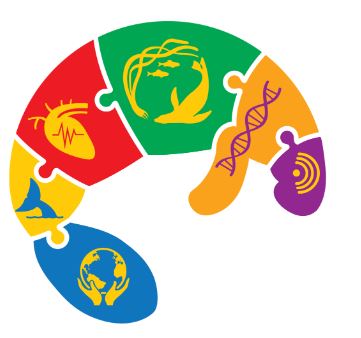November 28, 2022
by Mary Keenan

I woke up to the sweltering heat that could be only provided by Florida in August. It would be considered hot for anyone, but especially for someone who has spent the last two years soaking up the cool, dry Alaska weather conditions. I was so excited to finally attend and present at an in-person conference! I started my master’s degree during the pandemic and although I have already attended two virtual conferences, I wasn’t sure if I would ever get the privilege to attend one in-person.

Image above: The Society of Marine Mammalogy 2022 Conference logo.
The week started off with a small social ‘ice breaker’ for everyone to all catch up with science- friends from all over the world that they hadn’t seen in a while. Of course, from my perspective, it looked more like a room full of inspiring researchers and marine mammal lovers that I could only hope to one day know and work with. It was a great experience to connect and meet with new students from other areas in Alaska and across the country, bonding over our shared experiences of graduate school.
The next day the real learning began. Each morning started with a plenary speaker, all so diverse and each teaching valuable lessons about what it means to be a marine mammal researcher and what responsibilities that entails for each of us. The speakers discussed things from science communication, traditional medicine, triumphs and struggles in research, collaborations, perseverance, and the development and strides of marine mammal research over the past decades. The theme throughout all of the speakers that really stuck with me was passion. It was obvious that each speaker had such a passion for marine research and the desire to pass that passion along to new generations as research continues to develop and improve.
The conference had different oral presentations each day that were separated into several categories such as ecology, physiology, toxicology, etc. The numerous categories gave me the opportunity to learn not only about topics related to mine, but also about vastly different topics from what I am studying, such as acoustics, genetics, field monitoring techniques, and general ecology of many marine mammal species including many different cetaceans (whales, dolphins, porpoises), pinnipeds (seals, sea lions), and sirenians (manatees, dugongs). The only problem that I faced was having to choose which sessions to attend each day because many of them were occurring simultaneously.
Then came the poster session where I would be presenting my own research as well as learning as much as I could from other posters hanging in the conference hall. The poster session is typically a time for conference attendees to browse past hundreds of posters at their leisure and learn about current research that they are interested in. At certain times the researchers were scheduled to stand in front of their posters ready to answer any questions and engage in discussions about their research. After hearing about the potential awkwardness and hesitation that can sometimes accompany a poster session, I was feeling a bit nervous.
 Mary standing in front of her poster "Total mercury concentrations in Steller sea lion bones" during the poster session at the 2022 Society of Marine Mammalogy Conference.
Mary standing in front of her poster "Total mercury concentrations in Steller sea lion bones" during the poster session at the 2022 Society of Marine Mammalogy Conference.
My poster "Total mercury concentrations in Steller sea lion bones" focused on two important results of my research: (1) total mercury concentrations are greater in spongy rather than compact bone in both pup and adult Steller sea lions and (2) regions of long bones near the epiphyseal plate (the active site for bone growth on a long bone) have greater total mercury concentrations compared with mid-diaphysis locations. In my research, I concluded that mid-diaphysis compact bone exhibits the most uniform total mercury concentration in both pup and adult long bones and therefore should be used in future studies for consistent mercury quantification.
Despite my nerves, I went into my poster sessions with my head held high ready to change that stereotypical session into a great learning experience and surprisingly that is exactly what I was able to do. The poster session was one of my top highlights from the conference. I spent almost all of my allotted time (1.5 hours for two nights) engaging with people about my work and their own. I met a variety of people such as museum researchers, other graduate students (some working on similar topics), and university professors. I appreciated the opportunity to share the results of my research and to have meaningful conversations with fellow marine enthusiasts! The experience changed how I view poster sessions now and how I will continue to view them in the future because I realize now that they are nothing to be nervous about.
Through the connections I made and the influx of information about marine mammals all across the globe, the conference was an invaluable educational experience. I hope that I get to go back again in the future to keep the conversation going about my love for marine mammals and the best ways to conserve and protect them in the future.